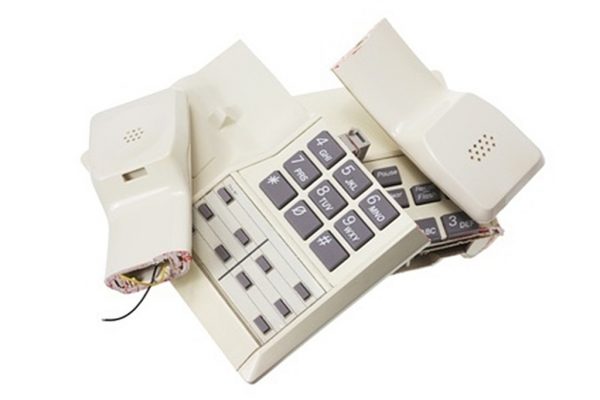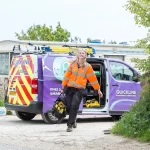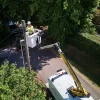Openreach Notify UK ISPs of Dec 2025 Line Rental Contract Terminations

Openreach and BT might have recently delayed their plan to withdraw old copper-based analogue line services (PSTN phones and WLR) from Dec 2025 to 31st Jan 2027 (here and here), but conversely they’ve also just issued contract termination notifications to all WLR providers with an effective date of 31st Dec 2025. Don’t worry, it’ll make sense.
Just to recap. The big switch-off was delayed in order to give broadband ISPs / phone providers, telecare providers and consumers more time to adapt. But the main focus of this delay is actually on the nearly 2 million people who use vital telecare systems in the UK (e.g. elderly, disabled, and vulnerable people), which often aren’t compatible with modern alternative IP-based (VoIP etc.) digital phone services.
In short, there was a risk that the digital phone switch-over could put the lives of vulnerable people at risk, which was tragically underlined by the recently reported deaths of two “vulnerable” Virgin Media Phone customers (here). This is alleged to have occurred after their health alarms failed, following the switch-off of their old analogue phone services. Ofcom are investigating VM’s handling of the digital phone migration (here).
Advertisement
However, if you read the update to our original Openreach story on 18th May (here), then you’d already know that the operator’s approach to this meant they’d still be terminating existing WLR contracts for ISPs at the end of December 2025 and expect that migration to continue at pace, which is in line with the previous plan.
On the surface this may appear to contradict the recent announcement of a delay to 31st Jan 2027. But the aim here is actually to be able to introduce NEW TERMS for the product and a three-month termination notice period to continue services where needed, while enabling some flexibility to support future processes (e.g. for vulnerable users). Openreach has now confirmed this with an official notification.
Notification of WLR contract termination
As part of our ongoing All IP programme, Openreach has issued contract termination notifications to all WLR CPs with an effective date of 31 December 2025. Where assets have not been migrated and/or cancelled by 31 December 2025, BT may, at our absolute and sole discretion, allow the services and assets to remain post 31 December 2025. Any continuation of services shall be on new terms and conditions which shall comprise the terms, conditions and charges of the current WLR contract save for the following revision:
- Clause 2.3(d) shall read as not less than 90 days’ notice.
The new WLR terms will be notified and published on the website.
We signalled this activity when we briefed CPs on BT Groups announcement of the delay to the PSTN switch off to 31 January 2027 in GEN048/24 (openreach.co.uk).
Openreach expects CPs to continue migrating their customers at pace, and we are terminating the contract to provide flexibility to develop future processes with CPs to address the remaining asset base.
CPs are reminded that any associated broadband service (FTTC / SMPF / sub loop SMPF) will be terminated when the underlying WLR service is ceased, as per business-as-usual processes.
Consumers who are vulnerable and worried about the transition to digital / IP based phone services should contact their provider for more information or to discuss options, as there are solutions being introduced to some of the problems; it’s also important that providers are able to identify those who may need extra help. But if your provider is already aware of a vulnerable status, then nothing changes. Today is all about background changes and the switch-off process continues.
Mark is a professional technology writer, IT consultant and computer engineer from Dorset (England), he also founded ISPreview in 1999 and enjoys analysing the latest telecoms and broadband developments. Find me on X (Twitter), Mastodon, Facebook, BlueSky, Threads.net and Linkedin.
« Sky Mobile UK Launching First 4G and 5G Unlimited Data Plan






















































They needed to do something to stop this rumbling on.
And why would that be Webber? We absolutely have to transition and have known about this for over a decade.
It isn’t that I don’t care about the tragedy linked above but the Care Providers should have migrated people to an IP related system ages ago. My own 90yo Nan switched over a year ago without incident and my other Nan has, whilst reservedly, been convinced to switch to FTTP and a VoIP system under the social tariff with BT. She doesn’t like a few things such as the absence of a dial tone but she got to keep her old phone and cassette based answerphone. If each case is treated with care it is easy to sort.
@Freedom
You said “And why would that be Webber? We absolutely have to transition and have known about this for over a decade.”
Did you wake up with a sore head? I am in full support of getting the legacy PSTN switched off ASAP and expect all providers to work with the end users to get it done.
@freedom
the BT digital voice service has a dial tone. for the most part, any phone/device plugged into the back of the BT hub will behave the same as it did on a PSTN line. (no pulse dialing however)
Will the old copper lines still work if you’re not on FTTP. For example openreach have delayed fttp in my area and said it wont be available until next December at the latest.
depends on what service you are referring to and who your ISP is.
This particular closure date only refers to the Openreach WLR PSTN phone service (mostly BT/EE/Plusnet customers who have an old fashioned phone line or ISDN service, as well as a few smaller ISPs who resold it). You already cannot buy a new WLR phone service except in very limited circumstances.
It has nothing to do with BT Wholesale ADSL services, LLU (eg TalkTalk or Sky phone/ADSL broadband) or Openreach FTTC. All of that continues until some other future date. Openreach is working with ISPs to proactively move people onto FTTP where it exists, however.
You don’t need FTTP for your phone service to be moved away from WLR. BT provides digital voice and business VoIP services on FTTC too. You can also opt to cancel the phone service and go broadband only.
There’s also the matter of the “pre digital phone line” (an exchange based service that acts a lot like the PSTN did) which will be offered as a stop gap in special cases, but BT hasn’t said too much about that yet. It won’t be offered to customers who have broadband however.
Priorities are not right to get this to work. Mobile coverage needs sorting out.
We don’t learn from experience in a hospital environment wonderful idea let’s have phones run over IP. Power issues, and suddenly we learn can’t phone anyone as network has failed
We still have less reliable FTTC and broadband fails, mobile coverage non existent!
When will we get safety top of agenda!
if your hospital can’t keep IP phones running during a power cut, that says more for the hospital than it does the technology (and it would still exist in a TDM PBX environment, ie anything short of having direct exchange lines right into the wards)
should be no trouble at all to keep critical network gear (including the PoE switches used to power the phones) on a UPS and generator just like they do for the critical medical facilities. given how reliant hospitals are on their IT, that should be the case anyway.
I see people still overexaggerate and make melodramatic statements about mobile coverage in this country.
All major hospitals have power back up so the phones will not fail due to power cuts
NHS IT Guy here,
All NHS sites with patient wards have to have a generator backup, not just for phones/IT, for the whole service.
any IT dept worth anything will then have UPS coverage on all kit to protect the generator switch over brown out.
Smaller sites will have UPS enough to run phones for between 30 and 60 mins, whilst BC Plans are put into place, any power cut longer than that, and the building will be closing anyway.
Yesterday I spoke to a representative of our local borough council supported telcare service (who was replacing a broken pendant) and she was fully aware of the transition away from PSTN. It seems that they will be replacing the devices with a digital replacement. I do not know when, or if it will be VoIP or mobile network based (I didn’t ask) but the issue with ONT backup duration may remain. At least the telcare operation centre monitors UP Power Network failures and it has been noted that there have been a significant number of power loss periods here.
As FTTP rolls out, the demand for PSTN will decrease to a level it will just be simply unecomonical to provide a PSTN service.
The vast majority of people do not require a PSTN service. My experience in the field of those on FTTC packages are that people simply don’t plug a phone in. They are paying for a service they do not want/need but it’s included as default in their FTTC package.
VoIP has been proven reliable if installed correctly. There are many workarounds available with the most important being a battery backup solution. These are still expensive but I am sure in the future, battery backup solutions will become cheaper. You can still request these with ISP’s free of charge but not all provide this.
There is still a small but dependent community on PSTN though. Those who are particularly elderly who do not have internet/want internet. You have those with a lot of validated concerns about VoIP. You also have those in rural areas that have no broadband coverage.
Those who cannot get broadband coverage, most already make use of either mobile internet or satellite internet and could easily use a VoIP service. Those who cannot, there needs to be a national network in place for VoIP via satellite or infrastructure needs to be put in place for a reliable mobile network. satellite is already available and becoming increasingly affordable.
Those who use legacy equipment that does not support mobile, will unfortunately need to upgrade, there should be grants provided by Openreach for this. This could easily be offset by the savings of turning off PSTN. It should be mandatory that any new installation of security/care equipment should be able to use broadband or a mobile network.
We cannot simply carry on the way we are with PSTN, it’s getting costly to maintain, it’s ancient and frankly, there is no need for it no more, there are plenty of solutions available but no ones actually saying this is the plan and this is what we have all agreed on.
Personally, I’ve seen a 10mbit increase in my FTTC connection since my landline was disconnected and I went to Digital Voice. I’ve also made my own battery backup solution with a £20 lead acid battery and a £15 charger. Mains goes into the charger, charger maintains battery, router is fed 12v directly from the battery. In the event of a power cut, I had 5 hours of power before I stopped the experiment as the voltage fell below 12v. The ring tone is the same, the dialling experience is the same, the sound is more clear. The only difference was the included voice mail service.
Can’t route the alarm system through 2G ?
Or come to that Tetra ? There are mobile handsets which can use either LTE broadband or Tetra
Or train super-nan to become a morse tapper on a cheapo ham portable … — …
It appears we don’t use gas street lighting anymore. We don’t have (many) red phone boxes anymore. We don’t have analogue TV anymore with it’s maximum 5 channels and it seems we don’t travel around in a horse and carriage.
So why all the fuss about upgrading the phone system and going digital. Having gone VOIP some time ago the most noticeable thing to me was the improvement in sound quality – no crackling and bleeping etc. Another plus is that its much easier to block tele-sale and scam calls.
OK so the self-powered PSTN system still works during a power cut assuming you don’t use a cordless phone but all the problems about care alarms and maintaining contact during a power cut are all easily solved with fairly low tech solutions.
Anybody want to go back to ‘dialling’ long phone numbers instead of having them stored and dialled automatically at the press of a button or picking up the phone and being asked ‘Number Please’ Come on guys this is the 21st century.
The risk of loss of service with VOIP on the data available to date shows you are less likely to have it fail then you are with an analogue line
This power fail risk is very small as well. You would have to have the power fail and need to make an emergency call and have no mobile signal. That’s a very small risk. If the loss of service would be critical to you have power back up even that though does not 100% guarantee the line will not fail